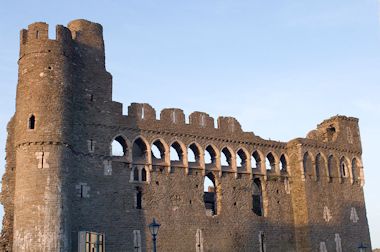
First Week in Swansea
It is the first week of the Spring Term at Swansea University! Like in the United States much of the initial class meetings are dedicated to poring over the course syllabi and getting to know the lecturer. This semester I am taking advantage of the large amount of medieval history courses offered by Swansea University to learn about Medieval Britain. I am enrolled in one course dealing with early medieval Britain, and one course covering the British Isles from 1250 to 1460. I am also taking a course on the Civil War to gain a US history credit that is required for my graduation.
A benefit to studying in Wales is that it provides a unique opportunity to see medieval castles in one’s free time. This is because Wales is dotted with hundreds of castles. In fact, there is even a small castle located within Swansea itself, one of which I have already walked past a few times while walking around town. With that many clustered within just a few square-kilometers of each other it can be hard to know where to start. Thankfully because the courses I am taking about Medieval Britain I have been able to learn more about the nation I am studying in. In my second lecture for my late medieval Britain course, the English conquest of Wales and the construction of various castles by King Edward I of England was discussed.
In 1276 and 1282 King Edward I of England and the Welsh Prince Llywelyn ap Gruffudd fought in two wars, with both resulting in an English victory. After the second conflict the Principality of Wales became the property of the English Crown. To demonstrate his power over his new possession and make the maintenance of military control of Wales easier, Edward constructed a multitude of castles. The most prominent of which is Caernarfon Castle, which functioned as Edward’s center from which to govern Wales. He also built castles in Conwy, Harlech, and Aberystwyth along with many more. The castles still stand today and can be visited.
Studying abroad provides a unique opportunity for history majors like me. It allows me to further my education while experiencing a new country and its history. Because my courses dealing with this nation’s medieval past, I can learn about the context in which many of the local landmarks arose before I go out to see them. As someone who enjoys travelling and is deeply interested in and passionate about history, I am extremely appreciative of the opportunity I have been given to study history abroad.
